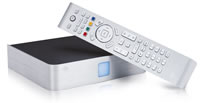 Video Networks Ltd (VNL) has announced that it’s broadband and Video on Demand (VoD) service, HomeChoice, now has 15,000 subscribers, since its relaunch in last September.
Video Networks Ltd (VNL) has announced that it’s broadband and Video on Demand (VoD) service, HomeChoice, now has 15,000 subscribers, since its relaunch in last September.
Eight in ten of their customers have also signed up to the company’s ‘triple play’ package that consists of broadband-delivered TV, broadband and voice calls.
It’s also taking this opportunity to announce that it’s going to be doubling the number of homes it can reach to 2.4 million in London and the Stevenage area, up from 1.2 million.
The VoD component of HomeChoice lets subscribers choose from over 1,000 movies, over 3000 music videos and hundreds of hit TV series, all available to watch exactly when you want.
“The concept of broadband delivered TV and VoD is very new to the entertainment-buying public and to already have 20 per cent market share of new DSL subscribers in our coverage area so soon after our launch is a great achievement. This gives us the confidence to significantly expand our network”, said Roger Lynch, Chairman and CEO VNL Ltd.
VNL initially made inroads into launching its phase 2 footprint in December 2004 when it enabled five new exchanges, including Stevenage – its first exchange outside of the M25. By ‘unbundling’ the exchange, called LLU (Local Loop Unbundling) in the trade, Homechoice is able to provide customers with a 6.5Mbit connection. 2.5Mb are used for TV and VoD delivery, and up to 4Mbit for Internet connection.
The company’s major marketing push for the re-launched HomeChoice service began in September 2004. During Q4 of 2004, VNL was responsible for one in five new DSL net additions in its initial launch footprint of 1.2 million homes.
The company has continued to build on what it offer its subscribers. In August last year, HomeChoice signed a retail deal with BSkyB enabling its subscribers to watch Sky Sports and selected Sky Movies channels on the service. It has also added telephony to its offering, and is about to launch a music download service that will allow HomeChoice customers to buy downloadable music tracks as they appear on screen. It also plans to double the speed of its broadband service from February, at no extra cost: 512Kbps will raise to 1Mb, 1Mbps to 2Mbps, and 2Mbps to 4Mbps.
 RealNetworks is enjoying record sales that have helped the Seattle-based Internet company to trim its fourth-quarter loss. The announcement comes amidst its ongoing cost of litigation against rival Microsoft, with whom it’s suing in a billion-dollar case for unfairly promoting its own media software.
RealNetworks is enjoying record sales that have helped the Seattle-based Internet company to trim its fourth-quarter loss. The announcement comes amidst its ongoing cost of litigation against rival Microsoft, with whom it’s suing in a billion-dollar case for unfairly promoting its own media software. Aura Communications has announced the first samples of its LibertyLink LL888 system-on-chip, for enabling high-quality wireless voice and stereo audio. The chip provides wireless stereo headphone capability for MP3 players, portable DVD players and audio-capable mobile phones – or indeed virtually any portable product where digital audio performance must be coupled with long battery life and low cost. The technology was previewed in ‘real life’ earlier his year by Creative Technology, whose wireless-enabled Zen Micro MP3 player is based on the LibertyLink LL888 chip.
Aura Communications has announced the first samples of its LibertyLink LL888 system-on-chip, for enabling high-quality wireless voice and stereo audio. The chip provides wireless stereo headphone capability for MP3 players, portable DVD players and audio-capable mobile phones – or indeed virtually any portable product where digital audio performance must be coupled with long battery life and low cost. The technology was previewed in ‘real life’ earlier his year by Creative Technology, whose wireless-enabled Zen Micro MP3 player is based on the LibertyLink LL888 chip. Google has added another product to its long list of extended beta services.
Google has added another product to its long list of extended beta services.  Napster, one of the largest players in music downloads, is considering offering a film download service. The new service would sit alongside its music offering and help to give the company a competitive edge over its rivals. The technology is already in place to download movies, so the same service model could easily apply to films, television programmes and video games, now that broadband connection speeds are getting faster and more prevalent.
Napster, one of the largest players in music downloads, is considering offering a film download service. The new service would sit alongside its music offering and help to give the company a competitive edge over its rivals. The technology is already in place to download movies, so the same service model could easily apply to films, television programmes and video games, now that broadband connection speeds are getting faster and more prevalent. Shanghai-based Fudan University has developed the country’s first home-made digital TV chip. Not only that, but the chip has passed appraisals by experts from the Chinese Academy of Sciences and Chinese Academy of Engineering, and it’s outperformed European and US standards in terms of sensitivity and anti-jamming capacities – at lower costs.
Shanghai-based Fudan University has developed the country’s first home-made digital TV chip. Not only that, but the chip has passed appraisals by experts from the Chinese Academy of Sciences and Chinese Academy of Engineering, and it’s outperformed European and US standards in terms of sensitivity and anti-jamming capacities – at lower costs.